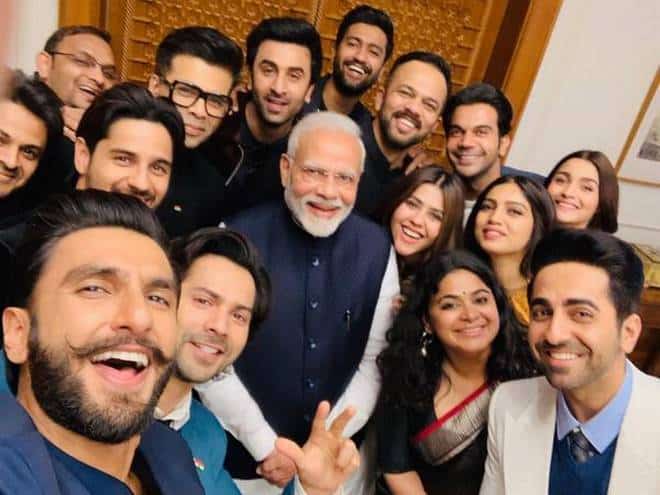The criticism of spinelessness and shamelessness is perhaps validly applied to the fraternity, although this covers players as diverse as the Hindutva poster-boy, Akshay Kumar, and the liberal-with-a-saviour-complex, Aamir Khan.
As two of Bollywood’s most popular Khans, Aamir and Shah Rukh, join a procession of celebrities who now regularly play courtiers to the country’s Public Relation (PR) minister, sorry prime minister (PM), the morale of progressive India is at its lowest ever and Bollywood finds itself, yet again, in the midst of an intense debate on arts versus politics, best showcased in the 1984 film Party.
In that classic, a young, idealistic K K Raina sees this as a false binary, but after a heated argument with the more jaded Om Puri, he realises that making a choice between the two might, someday, become inevitable. The argument we see today in Bollywood is one of its worst iterations.
Those who willingly become Modi’s props are using the “arts, not politics” justification with as much vigor as those who make good, political cinema while claiming to be apolitical.
The criticism of spinelessness and shamelessness is perhaps validly applied to the fraternity, although this covers players as diverse as the Hindutva poster-boy, Akshay Kumar, and the liberal-with-a-saviour-complex, Aamir Khan.
The median truth is perhaps to be found in Ranveer Singh, who embraced Modi with a big bear-hug Modi himself reserves for heads of states, before facetiously explaining to Anupama Chopra that he is very apolitical. He was piggy-backing on a more carefully worded statement by his Gully Boy co-star Alia Bhatt who claimed, “I don’t think we give out a strong political vibe as actors.”
Bhatt goes on to obliquely refer to the effects of trolling before concluding that she would rather focus on making movies than getting into any legal trouble. Chopra, at this point, is ready to let go but Singh insists on describing himself as an apathetic man who only cares about his films and his own life.
The interview summarises the crisis in Bollywood, showcased this week by the presumed betrayal of Aamir and SRK. There are celebrities like Bhatt, who has a political view but is keeping it to herself because there is much to lose and then there are those like Singh, who has no qualms publicly stating that he doesn’t care about anyone but himself. They shower Modi with love when the PM is only coercing Bollywood to be his personal marching band.
According to a HuffPost article, Modi’s PR team has been putting enormous pressure on Bollywood to participate in their events and follow them up with social media posts. Those who did not post their PM selfies were “gently reminded” to complete their homework.
Whether they are spineless or shameless or both, they are under pressure. As Deepika Padukone, who happens to be Singh’s wife, could testify, even people with relative power can be vulnerable in the face of relentless right-wing hysteria whipped up in campaigns such as the anti-Padmaavat one.
SRK and Aamir are not insulated from this world – Aamir has had several ugly episodes with the right-wing already. Modi’s machinery works on both ends – the endless appetite for trolling and threats of violence is the ugly underbelly for such glitzy PR events.
The pathetic state of Bollywood stars today, reduced to playing cheerleaders, mirrors the larger public sphere. Some chose to enthusiastically follow Modi or due to a herd mentality; others kept their politics private due to fear of repression or routinely protest despite shrinking civil liberties.
Regardless of these differences, we, today, stare at a breakdown of collective morale and an inclination, as a society, to surrender.
The stakes are only higher for the Indian Muslim community. This month also saw liberal stalwarts like Zameeruddin Shah and religious establishments like the Sunni Waqf Board surrendering their community’s claim over the Babri Masjid land if it could end the unbated communal hatred and violence.
The fall of King Khans represents nothing more than a symbolic victory march for an emperor who is parading the more colorful representatives of a collective that has now surrendered. The question of arts versus politics holds no weight in a world without choice.







